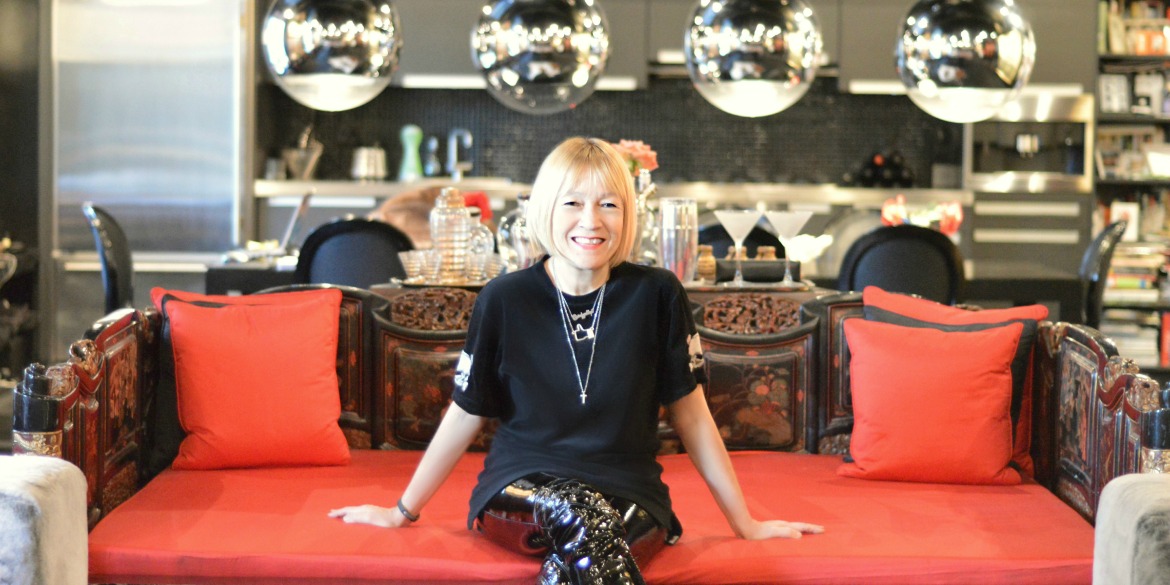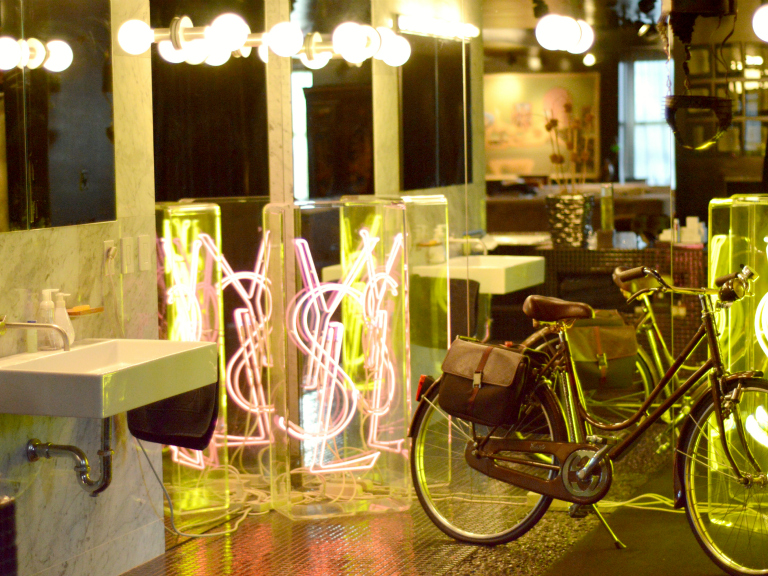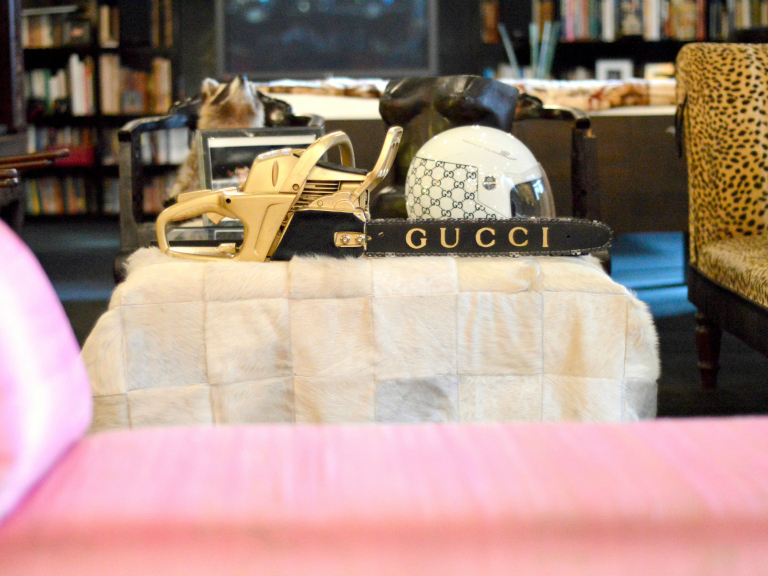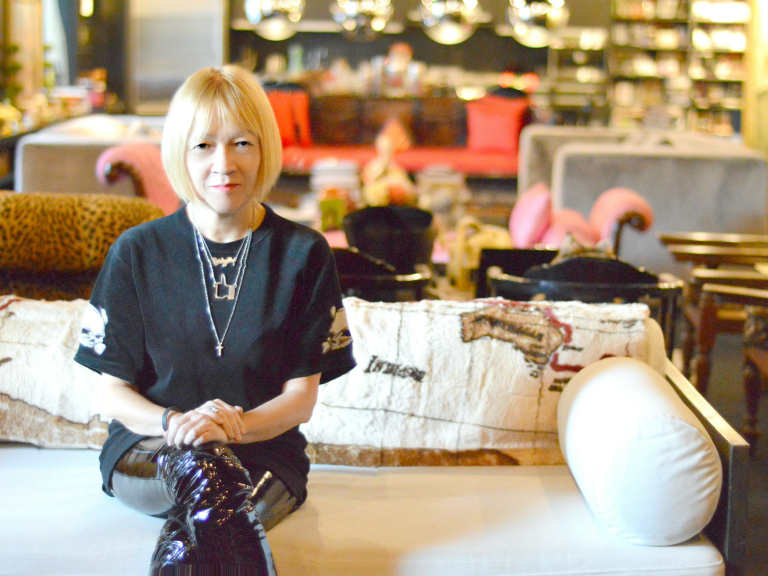Founder and former Chairman of Bartle Bogle Hegarty US, Cindy Gallop has been blowing up the brand building, marketing, and advertising business for over 30 years. Named Advertising Woman of the Year, Gallop has taken a radical approach to spreading the mission of brands like Coca-Cola, Ray-Ban, Levi, and Polaroid believing that shared values + shared action = shared profit. Now, Gallop is spreading her philosophy for transformative action as the Founder and CEO of IfWeRanTheWorld - a website dedicated to turning good intentions into shared micro-actions. Find out the secret to effective advertising, how you can change the world one micro-action at a time, and make a sh*t ton of money doing it.
Click here to take your first micro-action and run the world....

I believe very strongly that everybody should realize the value of what they create.
![]()
Creativity + Commerce
What are the characteristics of effective advertising?
The secret to making money out of advertising and brand partnerships for any content creator and blogger today is the same secret for making money anywhere (and actually it’s the secret for living a happy life), the secret is that you don’t do what the brand wants - you do what you want. If you have a blog or content that you want to monetize, start with yourself. This is assuming that your content is an expression of you your values, what you stand for, and what your brand is all about. Define what you believe because that’s how you find the right brand partner for you and how you know you can deliver something that will be equally valuable to both them and to you.
When you have a very clear sense of your values and you project those through your content, Youtube channel, or blog – you make that the filter by which you seek out brands you want and filter brands that approach you. You then have a way of articulating what you have to offer a brand because you’re mobilizing an audience that’s attracted to those same values. Then you can create a very strong case for why the brand should be paying you to do something really interesting together.
Watch Cindy's bSMART interview here!
You should be able to give your audience something that will benefit them and enable them to spread that benefit.
![]()
How do micro-actions impact the effectiveness of an advertising campaign?
Micro-actions are a fundamental part of my own philosophy and why I built my start up If We Ran the World. There is always something that lies at the heart of every brand that’s a way to ensure its audience can act, in some small measure, to do something good in participation with the brand. I’ll give you an example: the Dove Real Beauty Campaign. I bring that up because obviously it’s a very well known campaign, but also because it’s a very laudable initiative on the part of Unilever, the owner of Dove, to get people to re-think the aspirational ideals of beauty that surround us that are utterly unrealistic, and to focus on how beautiful everybody is in their own way. Whatever brand you're working with there will be some action you can share with your audience that helps everyone see the benefit of the brand and makes everyone feel good for doing that.
A micro-action is a bit like a tweet – 140 characters or less. It’s the incredibly small, simple action that’s so easy to do, why not do it? If you wanted to spread the Dove message of real beauty, you could ask your audience to do something very simple: every day take one micro-action such as compliment a complete stranger. Now you have the opportunity to spread the real beauty message as you walk down the street. Compliment a stranger on what they’re wearing, their shoes, their smile, the way they look - man or woman. (Obviously, do this in a way that you feel comfortable and safe.) Nobody objects to a compliment. I compliment people as I walk past them, as I leave a coffee shop – it’s something that makes people feel good about themselves instantly, and that’s fundamentally what the Dove Real Beauty Campaign was designed to do.
Action is very transformative. Doing something, however tiny, instantly makes us feel differently about what we believe we’re capable of doing. Everything great in life and business starts with a micro-action. Think about how working in tandem with brands allows you to micro-act together to make the world a better place.
What is your advice for choosing the right brand campaign and partner?
If you’re approached by brands, ask them to articulate their values and see if you share them. I’m a big believer in being your own filter. In my case, I work as a business consultant and I characterize my approach to consultant work as - I like to blow shit up. I’m the Michael Bay of business. But I do this very deliberately, not as a bit of creativity or a bit whimsy or fun. I do it because when I use that characterization, it attracts the people who want what I do, and it repels the ones who don’t. And I sure as hell want to repel the ones who don’t, because that’s a huge waste of everybody’s time, effort, and money.
I hate the word ‘sponsor,’ because it’s a very passive word. I would rather focus on the shared action, which is why I like the term ‘co-action.’ If a brand has approached you, and wants to sponsor your content, presumably they see a value to themselves and they see something your audience could do as a result – and that’s not simply buying their product. Every brand worth its salt has a mission, an agenda, that’s about benefitting people, and society, through its product.
What I recommend in any paid relationship with a brand, is that you say, ‘I don’t like the term ‘sponsor,’ because that sounds passive. I want to make things happen for you, with you, and with my audience, that makes all of us feel good about this relationship. Let’s talk about the values that we share, the things you want to see happen, and that I want to see happen, and let’s figure out how together with my audience we can co-act in a way that makes all of us feel great about the opportunity we’ve been afforded.’
Define what you believe because that’s how you find the right brand partner and deliver something valuable.
![]()
How can content creators maximize the impact and sales for a brand?
It’s important to recognize that there is absolutely nothing wrong with being paid to promote a brand to your audience because the brand should share your same values. It’s also important that you and your audience have the opportunity to get something out of this relationship with the sponsor. Together with a brand, you should be able to give your audience something that will benefit them and enable them to spread that benefit further.
I believe the business model of the future is: shared values + shared action = shared profit. The benefit is financial profit, as well as social profit. When brands, businesses, and companies come together on the basis of values you share, you’re then enabled to collaborate, to collectively co-act on those values. You can translate those values into shared action, which allows you to then make things happen in the real world. Whatever happens will benefit consumers, society, and the brand’s business. Identify your own values and then find brands that share those values.
Everything great starts with a micro-action.
![]()
How can content creators make online advertising a source for good?
Thirty years of working in brand building, marketing, and advertising have made me believe very strongly that the future of business is doing good and making money simultaneously. I believe in a future where you make money because you do good. You find a way to integrate social responsibility into the way you do business on a day-to-day basis. Therefore that good becomes the key driver of future growth and profitability.
I believe very strongly that everybody should realize the value of what they create. And I believe this because my background, career-wise, began in theatre. Theatre and advertising are two industries where ideas and creativity are massively undervalued – even by the creators themselves. But I believe when you create something that gives people pleasure, you should absolutely see a return on it. And the more people you give pleasure to, the greater that return should be. That’s the business model I’ve designed my own start-ups around.
The future of business is doing good and making money simultaneously.
![]()
Galloping to success
What has been your biggest lesson learned being a female leader in advertising?
My advice on how to be a female leader in any industry is actually my advice on how to be a male leader. Leadership stems from having a very clear sense of who you are and what your beliefs and values are because you are a key part of informing the values and the culture of your organization.
As a leader, the single most fundamental thing you have to do is to put your people before yourself. To do that, you have to have a very strong sense of the values you’re going to bring to them on behalf of the organization. It’s about connecting to them through those shared values – again, sharing the same values is the fundamental basis for any great relationship. That’s what enables them to trust you, to want to work with you, to want to follow you as a leader, and it’s what enables you to make sure you look after your people in the way that they should be looked after. Everything else flows from there.
Leadership stems from having a clear sense of your values because you are a key part of informing the values of your organization.
![]()
What is your advice for finding funding as a female entrepreneur?
There are a number of reasons why a pathetically small percentage of female-founded businesses are venture-funded, and funded generally, versus the colossal proportion that are male-founded. In the tech world, we often see men get funding for businesses with highly uncertain outcomes because the young male founder reminds the Venture Capital investor of himself at his age. He can connect with this vision because it expresses male interests. Women, on the other hand, are naturally distrusted and have to explain every single aspect of what they do and still don’t get the funding. In that situation you just have to think, ‘It’s about them, it’s not about me, on to the next one.’ I’d love to see women adopt some of the male attitude of ‘it’s just business’ and be able to have those meetings and move on to the next one. And at the same time get absolutely fired up and motivated knowing that you’re going to prove them wrong.
Similarly, I would love to see men develop more feminine values in approaching business with the approach, ‘I shouldn’t just model what I think men will buy into, rather I should do things that have values that I believe in and have real potential. And I should work with women to access audiences that are as much about female interests as male interests.’ It’s a very large and complex area on why women don’t get funded as much as men.
The best thing you can do is to realize it’s not about you - it’s about them. Be more thick-skinned, move on to the next one, and at the same time do everything you can to bootstrap your company, find different sources of funding, and don’t take too many of those meetings where you get rejected. My advice generally to people is to stay away from people, places, and things that make you feel bad about yourself. As an entrepreneur, you don’t need anymore thoroughly depressing conversations than you already absolutely have to have. If someone requires too much convincing, move on. Withdraw from the dialogue, and carry on projecting your own values. You will connect with the people who want what you want.
As women, we don’t get taken seriously until we get taken seriously financially.
![]()
How can we be smart when growing our brands and business?
Women, it’s absolutely fine to be passionate about a business. And you don’t necessarily have to start the business with the aim of growing it, selling it, making money off of it and moving on to the next one, as many men do. I would urge you to make your business as big as it can be on your own terms. And that’s absolutely about finding the right investors and doing things that are right for your business. It’s also fine if what you want to do is be able to support yourself and live a reasonably comfortable life with your business.
At the same time, there are many women who want to grow very big businesses. One of the reasons they don’t get the funding they deserve is because those businesses will come out of things that women will have observed there’s a real need for in a female audience. A massively male-dominated investor world doesn’t get how huge those female markets are. There’s a huge amount of money to be made in taking women seriously. Unfortunately, we are all too often not taken seriously by investors because we start businesses to do with fashion or beauty for example. Not all men can relate to that so they say, ‘oh, it’s a lifestyle business.’ Whereas when you’re a woman, you know how colossal the fashion and hair care business is.
When you create something that gives people pleasure, you should absolutely see a return on it.
![]()
How can we be smart as women leaders in business?
I want to say one thing very emphatically to all women bloggers, content-creators and whoever’s watching this - it is totally okay to want to make and to make a shit ton of money. As women, we don’t get taken seriously until we get taken seriously financially. I want to see a woman build a billion dollar business. I want to see a woman get funded at the same ridiculous levels as those tech and business ventures led by men. I want to see a woman make a huge exit, through an acquisition or a sale. I want to see a woman lead a huge IPO for her company.
Women, you need to do that on behalf of all of us. There are a lot socio-cultural dynamics to overcome because from the moment we are born, we’re unconsciously made to feel that money is not our area - that it’s a male area, that it’s unfeminine to focus on money, and that it’s unwomanly to want to make lots of money. There is nothing wrong with making lots of money, and I want to see women really come into their own financially.
I would ask you to really think about how you make money. Too many people in business think, ‘oh this is the business model that this industry operates on, this is the way it has always made money, and it’s the only way it will ever make money,’ or think, ‘there’s a set number of business models out there and I have to use one of those.’ Your business model can be anything you want it to be. And in fact, a really good starting point is to ask, ‘how would I like to make money?’ You may think, ‘I don’t like the macho, masculine-values-driven model of making money in the industry. I want to make money in a completely different way. Design that business model and implement it. But in all of this remember - it’s absolutely fine to want to make money, it’s fine to talk publicly about making money, and I really, really want to see you make a shit ton of money.
I really, really want to see you make a shit ton of money.
![]()
Spotlight on Cindy Gallop
Neighborhood: Chelsea
Occupation: Entrepreneur
Women I Admire: Every woman who's ever decided to live the life she wants to live and not give a damn what anyone else thinks.
Dream Mentor: I don't believe in mentors. I believe in champions: people who will go out on a limb for you and make things happen for you.
Look of the Season: Whatever makes you feel when you put it on that you can go out and conquer the world.
Go-to Outfit: Tom Ford for Gucci head-to-toe black leather.
Signature Scent: Yves St Lauren 'Nu'
Beauty Essential: Orange-red lipstick
Cocktail of Choice: Grey Goose martini, straight up with a twist.
Travel Destination: Toss-up between Bali, Shanghai and Tokyo.
Best Advice: 'Get more sleep.'
Favorite Quote: 'In order to predict the future, you have to invent it.' - Alan Kay
College / University: Somerville College, Oxford University
Cindy Gallop was photographed in her apartment in Manhattan, New York City.
![]()










Comments (0)